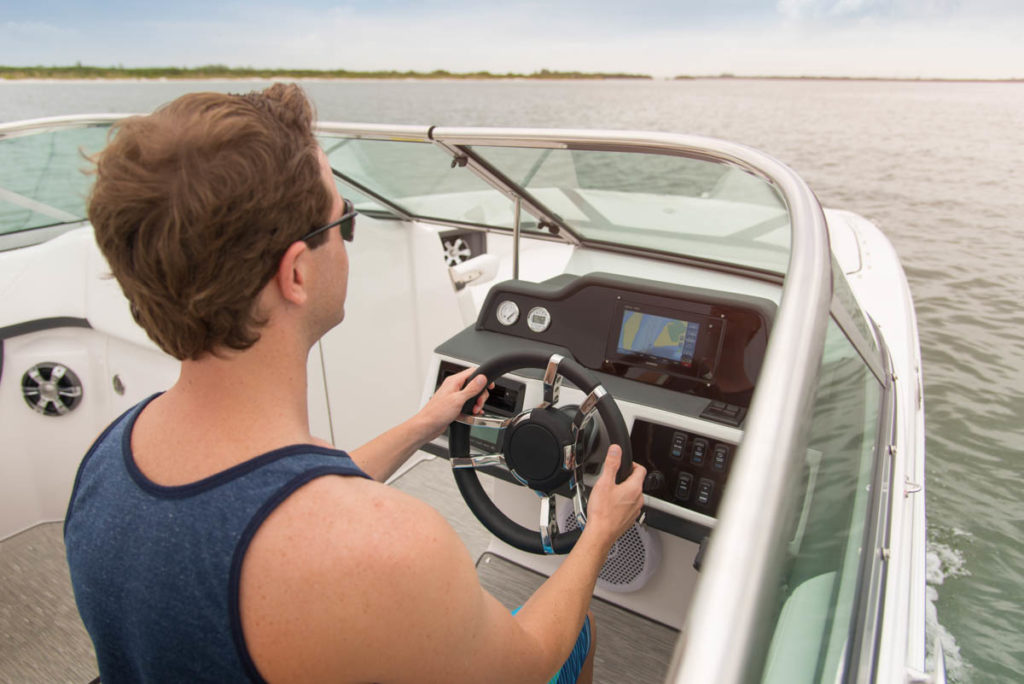A boating “accident” is defined as an unfortunate incident involving one or more boats, which happens unexpectedly and unintentionally, and typically results in damage or injury.
Please notice the reference to “unexpectedly.” If we figured for a moment that an “accident” was imminent, we would could likely avoid it. But by definition, we never know when that fateful moment will arrive. This underlines the critical importance of paying attention to every detail that is happening around you while you are boating. So we shouldn’t be surprised to see that the latest US Coast Guard accident report lists “inattention” as the number one cause of boating accidents. Yes, they still list alcohol, speeding, and no life jackets as major problems, but they now report as number one, what I have always known to be a serious culprit in boat accidents — lack of attention. Boating provides no shortage of distractions between chatty passengers, persons in tow, and things to look at on shore. And when it’s quiet, just the peaceful boating experience itself can be distracting.
But when you do see a situation developing, you still need to have the driving skills to avoid an accident. That is why the latest stats put “lack of boat driving skills” as the number two cause of accidents.
Few people who ski begin by zooming down a mountain out of control. They almost always begin by taking at least one ski lesson from a professional. Yet there is no shortage of boaters today who have never taken an on-water course and are not familiar with the limits of their boat. They don’t know how to control wakes, and some struggle to dock smoothly or with any consistency. Both skiers and boaters benefit from seeking training to improve their skills and at the same time, making their sport safer for themselves and others. The current stats tell us that 77% of deaths on the water occur in boats where the operator had not received any formal boat driving instruction.
Other causes of accidents listed in the report are interesting. 75% of fatal boating accident victims drowned, and of these victims 86% were not wearing a life jacket of any type. Alcohol was the leading factor in 18% of deaths and a leading known contributing factor in fatal boating accidents.
The highest number of accident by type of accident were collisions with another vessel. Of these, 46% were open motorboats, 22% were personal watercraft, 13% were cabin motorboats, and 9% were pontoon boats. Moving further down the list of accident types we see flooding, colliding with a fixed object, grounding, and machinery failure.
There has been an increase in recreational boating during the COVID-19 pandemic based on reports of increased boat sales, insurance policies procured, insurance claims, and calls for towing assistance. I have calculated that currently
Should you have the misfortune to be involved in a boating accident that results in death, or injury that requires hospitalization, or damage exceeding $5,000 — remember that in Canada you must report it to your local police service (not Coast Guard) without delay. Lesser accidents with minor injuries not requiring hospital care and damage between $2,500 and $5,000 must be reported to the Canadian Ministry of Transportation within 14 days. You can find the appropriate form online and then email it to the Ministry.
But we all want to avoid a boating mishap, and todays accident reports lead us to an interesting conclusion. Knowing that the top contributing factor in boat accidents is operator inattention, we can avoid becoming part of next year’s statistics by adopting a new boating mantra: “Pay Attention.” This includes asking a passenger to act as your ‘spotter.’ They are usually happy to oblige and the extra set of eyes is very helpful. Remember to follow piloting procedure by scanning for traffic and other obstacles by moving and focusing your eyes in segmented sections and not just a single sweep. Of course, you should also learn the many important driving skills needed from a professional.
So the latest Coast Guard reasoning is that once boat driving skills are improved and boaters recognize the need to stay focused, accidents will be reduced and a greater safety culture in the entire boating spectrum will evolve. Now, if we can all just do that!







